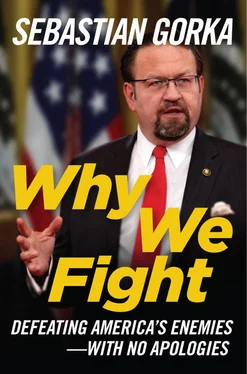As recounted in his remarkable autobiography, Witness , [3] Whittaker Chambers: Witness , Regnery History, originally published in 1952.
Chambers had no intention of turning on his former masters and siding with democracy. He just wanted to disappear and protect his family from the NKVD (the predecessor of the KGB). But then, geopolitics intervened.
In 1939, Stalin and Hitler made a deal, the infamous Molotov-Ribbentrop Pact, whereby the Soviets and the Nazis agreed not to attack one another and divided up Europe between them. At this point, any lingering doubts Chambers had about the moral character of his former cause disappeared, and he could admit to himself what he had known deep down for so long: communism was an evil ideology that had led to the murder of millions since 1917 and was predicated on the crushing of the human soul.
Just as importantly, he finally understood his own culpability. He had personally assisted the most dangerous dictatorship on the planet and helped it kill those it saw as its enemies. It would not do, he realized, to stay in hiding. With the encouragement of a Soviet intelligence officer who had defected to the West, Chambers decided to share what he knew with the government of the United States. It was his first step down a path that would make him the most famous—and infamous—public witness to the threat of Soviet subversion of the American state. But his journey would be a long and painful one.
At first, the official response was nugatory, or at best, lukewarm. The bureaucrat he was introduced to at the State Department took the names of the Soviet moles that Chambers gave him and sent them all the way to the White House. But the West Wing showed no interest in this information, and the FBI, apparently preoccupied with the Nazi threat, failed to prioritize it. Meanwhile, the Soviet defector who had convinced Chambers to reveal the spy network was found dead in a Washington, D.C., hotel room with no fewer than three suicide notes next to his body.
Chambers’ evidence of subversion at high levels, including the names of people in the communist underground with whom he had conspired, went unheeded for almost a decade, but when the American body politic finally awoke to the threat of Soviet domination, he was called to testify before the House Un-American Activities Committee (HUAC) in the first televised hearing of its kind in US history. One of the persons he identified as belonging to the communist underground of the late 1930s was Alger Hiss, a doyen of the East Coast elite.
A good-looking graduate of Johns Hopkins and Harvard Law School, Hiss had served in the Department of Justice before World War II and then in the Department of State. He was a central figure in the meetings that established the United Nations after the war and one of the highest ranking American officials at the Yalta Conference, shaping our negotiations with Stalin about the disposition of Europe after the war. At the time of the HUAC hearings, Hiss was still a member in good standing of the influential elite, serving as the president of the Carnegie Endowment for International Peace. The establishment rallied to his defense and two Supreme Court justices testified to his character.
Hiss denied that he was ever a member of the Communist Party, that he had ever known Chambers, and that he had ever done anything untoward in the interests of Moscow. His accuser—overweight, ill-kempt, and unhealthy—seemed thoroughly outmatched. Chambers was attacked day in and day out in the press, and Washington buzzed with the wildest rumors that he was a closeted homosexual, responsible for his brother’s suicide, and even accused him of pedophilia. All of Hiss’s denials under oath were destroyed when his lawyers made a fatal mistake.
Hoping to undermine Chambers’ credibility and dig up evidence that would make Hiss look good and Chambers look bad, they sued Chambers for defamation, demanding all and any materials in his possession related to Hiss. HUAC subpoenaed all the documents, which included those Chambers had left with his relative for safekeeping all those years ago when he feared for the lives of his wife and children.
The evidence handed over to the committee included more than sixty-five pages connected to Hiss, many demonstrably typed on his own typewriter or written in his own hand, as well as confidential coded documents that Chambers could have obtained only from Hiss. This evidence proved that Hiss had been in contact with Chambers after 1936, which he had denied under oath. It also proved that he had been involved in espionage, but the statute of limitations on espionage had run. Hiss was charged only with perjury, convicted, and given a five-year sentence. [4] To this day there are those who insist on Hiss’s innocence, even though the ultra-secret Venona intercepts, since declassified, clearly show that he was not only a secret communist but an agent of Stalin and the Soviets.
The best way to understand the significance of what became known as the Hiss case is to read Chambers’ autobiography, especially the introduction, which is framed as a letter of explanation to his children. It is also worth watching Hiss’s and Chambers’ testimony before the House to see both the polished Ivy League lawyer aggressively but smoothly lying and Chambers reluctantly bearing witness to the truth. [5] C-SPAN still has many video links of the original HUAC footage, starting with this one of Hiss’s denial and Chambers’ response: https://www.c-span.org/video/?79536-1/hiss-chambers-hearing
For Chambers, this was much more than a personal story about friends who had betrayed their employers and their nation. This was a struggle for the survival of the civilization into which he had been born; a battle over foundational questions about man and God. Half the world said there was nothing above man, nothing beyond this earthly life. For Chambers, what was at stake was as transparent as the simplest of mathematical sums. Communism can exist only if there is no such thing as the human soul. If there is no soul, then anything may be done in the name of communism. And for a man who saw the existence of God in the beautiful intricacy of his infant daughter’s ear, the response was clear: The “crux of this matter is whether God exists. If God exists, a man cannot be a Communist.”
The sadness of Whittaker Chambers was the result of his belief that America was doomed to defeat. The Enlightenment had left the atheists and the worshippers of man’s omnipotence ascendant. The West had lost confidence in itself, a confidence that was not at all lacking in the enemies of the Creator, be they Adam and Eve, who first placed themselves above God in the original act of disobedience, or the totalitarians in Moscow, who in the October Revolution had declared themselves God.
Nevertheless, Chambers never gave up. He bore public “witness” to the truth and the American ideal despite what he saw as impossible odds. And he did this knowing how he would be excoriated by those he uncovered and by the elite who would never believe what he had to say, yet could prove.
Whittaker Chambers was one man against the world, but a man on the side of the angels. His lesson must not be forgotten: the totalitarians claim a monopoly on the truth. Anyone who challenges them must be destroyed. In 1939, it was the Nazis and the fascists. From 1948 to 1989, it was the communists. Today, it is the jihadists and all those who wish to destroy us in the name of their ideology. America is defined by freedom, totalitarianism by its denial. Whittaker Chambers suffered for America, but for all the right reasons. He was, is, and always will be one of our nations heroes. [6] In 1984, Whittaker Chambers was posthumously awarded the Presidential Medal of Freedom by President Ronald Reagan for his contribution to “the century’s epic struggle between freedom and totalitarianism.”
Читать дальше












